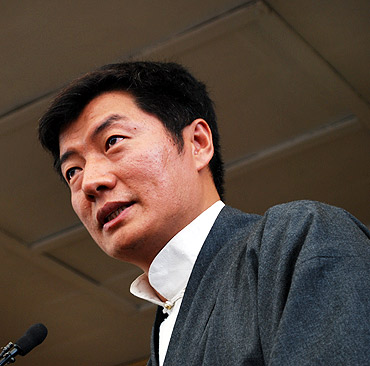
A few days after the announcement, the ballot box spoke out: Dr Lobsang Sangay, born in India 43 years ago and educated first in India and then at Harvard Law School, was elected as the new Kalon Tripa (prime minster).
Many in the Tibetan community saw Sangay as a Tibetan Obama.
'Change' was the buzz word in Dharamsala, home of the Dalai Lama in Himachal Pradesh. Even the Tibetan charter (constitution) had to be amended to reflect the change: Article 1 of the charter now terms the Dalai Lama as the "human manifestation of Avaloketeshvara, the guardian and protector of the Tibetan nation," but with no political power.
Claude Arpi travelled to Dharamsala to record the newly elected prime minister's views on the election campaign, his objectives, his government's relation with China and the changes he would like to bring about in Tibetan society. Dr Lobsang Sangay candidly answered all the questions put forth to him.
Can you say a few words about yourself; your 'Indian' life and your 'American' life?
Both my parents fled Tibet in 1959 along with His Holiness the Dalai Lama. My father was a monk during the guerilla resistance; he fought some battles, then he came to India.
All his family members were left behind in Lithang in Kham province. From my mother's side, all the family members managed to come to India, with the exception of one, who went back to Tibet to fight the Chinese army; he never returned.
I grew up in a very small Tibetan refugee settlement between Darjeeling and Sonada in West Bengal. From there, I went to the Central Tibetan Schools of Sonada and Darjeeling. Then, I attended school at St Stephen's in Darjeeling and later went to University of Delhi where I obtained degrees in arts and law.
In 1995, I left for the United States as a Fulbright scholar (it was originally for two years, but later I got other scholarships). I pursued MA at Harvard Law School and completed my PhD in 2004.
While I was in Delhi, I was elected as a Tibetan student leader, and later joined the Tibetan Youth Congress as a member of the National Central Committee (CENTREX).
When did you decide to start campaigning for the post of Kalon Tripa?
At first, I did not have plans to run for the post of Kalon Tripa. Till the fall of 2009, I did not attend any special course. I remained in Harvard Law School, with the East Asian legal studies programme, mostly working on China-related programmes.
In early 2009, the Tibetan community started talking about the election of the Kalon Tripa, even a website was created. By fall 2009, I started to take courses in leadership, communication, election campaign and so on.
By spring 2010, it became serious; some national organisations began nominating me. I thought, "OK, why not give it a try". On Radio Free Asia, they had this weekly programme on democracy and the rule of law. I was often asked questions like, 'how to improve our legislative system?'
My answer was, "Candidates should go to the people, candidates should debate amongst themselves; they should share their policies and platforms, they need to be well-informed".
I said this all along. When this platform for the Kalon Tripa elections was offered to me, I thought I should do what I always preached: "Go to the people and debate about policies".
This was really appreciated by the people. Sometimes thousands turned out in monasteries, in schools, refugee settlements, everywhere. It was a first. I never asked for votes, I just said, these are my ideas, "If you don't like them, sorry to have wasted your time".
...
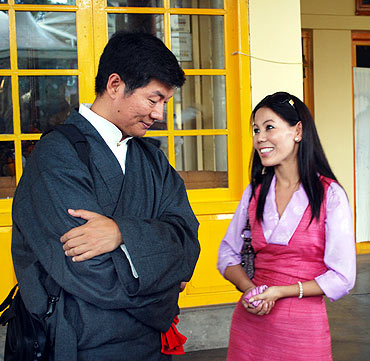
I have the vote bank of the younger generation, but also the older generation, above 60. The monks also voted for me, and often women.
There is a famous picture of you just coming out of the booth and many nuns are looking at you in a beatific way. Did they vote for you?
Yes, they voted for me.
Tibet expert Robbie Barnett wrote in Foreign Policy that it is the first time that the election of a prime minister, not recognised by any government, was reported so widely in every corner of the planet.
It is the (Tibetan) people's recognition all over the world. It appeared in all the main newspapers: The New York Times, the Washington Post, Le Monde, London Times, etc. I was told that even a village newspaper in Switzerland reported about the campaign.
Was it enriching for you?
In the beginning, during the first round, the candidates visited only a few places, but for the second round (it was a two-round election), the three candidates travelled to all the settlements.
It was very enriching because for the first time during a campaign, candidates had to face the people, face their tough questions. We had to face the difficult terrain, the high altitudes of Ladakh, we crossed the Brahmaputra river and went to the border of Tibet, then all the way down to the hottest settlement in Maharashtra and then down south to places in Karnataka, and also to Europe and America.
It was indeed very enriching. It was more difficult than any other campaign where you remain in your own constituency or at the most, you conduct a national campaign. Ours was a cross-continental campaign from Europe to Asia. It was a widely reported and testing campaign.
You got 55 per cent of the votes as compared to 80 per cent for Samdhong Rinpoche in the previous elections. Soon after his first election, he had told me that he would not have accepted the job if he had got only 50 or 55 per cent of the votes. He wanted to be the prime minister of ALL Tibetans. Are you the prime minister of all Tibetans?
I feel that I am the PM for the entire community in exile as well as the Tibetans in Tibet; this, for several reasons.
First, I understand why Samdhong Rinpoche says that. He had a stature; he was a great scholar, speaker of the parliament (who is higher than the Kalon Tripa as per protocol). That is why he could have this expectation, but he did not have any opposing candidate.
I was competing against a former prime minister and the most seasoned Tibetan foreign minister. In a democratic election, if you receive 10 per cent more votes than any other candidates, it is considered as a landslide. I had 17 or 18 per cent more than the second candidate. The Tibetans in Tibet also voted!
How?
They went to the monasteries to pray, lit butter lamps, went to mountain tops to burn incense, they sent me kathags (ceremonial scarves) and messages, some even through Facebook.
After I won, people of Kham and Amdo provinces in Tibet sung songs. One song speaks of the Three Lions (two Lions on the Tibetan flag and Sangay, 'lion' in Tibetan); another one quoted my campaign theme -- 'the Legacy of my late Father'. Indirectly, they voted for me.
Most importantly, I was blessed and authorised by His Holiness, who devolved his political powers to the elected leader.
I have a historical legitimacy which, combined with the democratic legitimacy (the actual votes) and the indirect vote from inside Tibet, I have all these mandates.
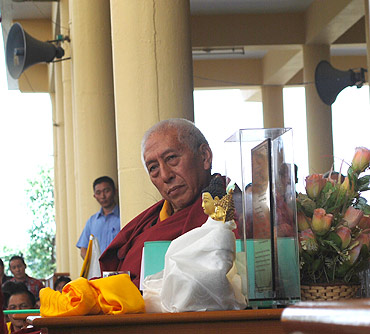
Yes, it was five weeks before the proclamation of the result. After the results of the first round, the Chinese probably knew that I would win and they started attacking me. They tried to preempt the democratic mandate. In one way, they added fuel to the fire, by putting this 'terrorist' label on me. It drew more attention on our election process (in the international press).
They tried to preempt the legitimacy of the election; they were worried that it would expose their own lack of democracy in Tibet where the Han Chinese are the rulers and the Tibetans are second class citizens.
The Tibetans in Tibet have no right to elect their own leaders; the main posts are held by Han Chinese. They are probably worried about the fact that our administration in exile is democratic.
The Chinese-nominated chairman of the Tibetan Autonomous Region, Pema Choling, said in a press conference that you are 'illegitimate'; according to him, he is the only legitimate leader. Any comments?
(Laughing) How can he call himself legitimate? Nobody has voted for him. I am legitimate because people have voted for me through a free and fair election. It is how I got my mandate.
For him, it is a top-down imposition by the Communist Party. He is just a face, a name, while the power is held by Han Chinese who stand behind the scene. What is his legitimacy, no one voted for him!
The Chinese Communist Party says that 'democracy' is an American invention. They have been repeating this since the recent Arab revolutions.
No one says that we should adopt the American or French system. The Tibetan system that we are practicing here is unique; it is neither American, nor Indian, nor French. It is Tibetan and unique.
The main premise is that people vote and elect their leader. People here can speak against or for any leader; it is one of the premises of democracy.
You just mentioned that many young Tibetans voted for you, hoping for 'change'. What changes will you bring?
The biggest change was to vote for me. There was a lot of expectation for change, the voters wanted a change and they got that change. They voted for a man who is born in exile, a man who is not a monk; it is already a change.
Would you call it a secularisation of governance?
Yes, but also the infusion of a young leadership, new ideas. Electing me is the biggest change and with the 'authorisation' of His Holiness, it is a historic change.
What I promised on my platform is: Tibet was an independent nation, it is now under occupation. I support the middle way policy because as Kalon Tripa, I have to follow the policy of the Tibetan administration.
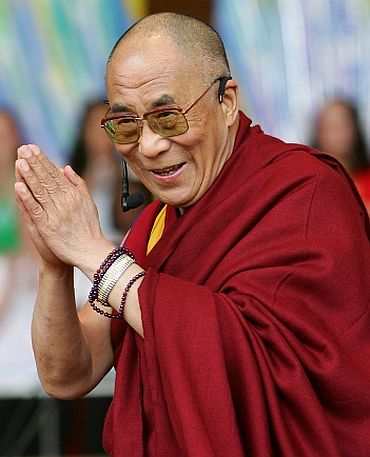
It is the parliament that can change policies; I have to implement these policies. I also promised the restoration of freedom in Tibet, the return of His Holiness to Lhasa, the professionalisation of the administration and education and welfare for all.
Knowing that I was coming to Dharamsala, an Indian friend told me: 'Oh, you are going to meet the new Dalai Lama'. Are you the new Dalai Lama?
Not at all.
His holiness the Dalai Lama is irreplaceable. He is the most revered leader and we have tremendous faith and loyalty toward him. What I am assigned to do is to fulfill his vision of secular democracy. I hope that I will live up to expectations, but I am committed to be the face and spokesman of the Tibetan people.
Don't you think that the gap of five months between your election and your taking over is too long. The administration has been paralysed for all this time.
Two things, first we had to work on the constitutional amendments after the Dalai Lama announced his 'retirement', this delayed the process till the beginning of June. Till March, we did not know that this would happen.
Second, the present Kalon Tripa, Samdhong Rinpoche, wanted to leave in the beginning of June, it is I who requested him to stay. This is a typically Tibetan situation. Normally, whoever has been elected is in a hurry to take over, and whoever is in power would like to stay on. But here in Tibetan style, he wanted to leave and I wanted him to complete his term (on August 14).
Many Tibetans told me that the young PM should use the old PM's experience. Do you agree?
Yes, I said so all along. I will seek his advice. I have also said that I will appoint ministers from the present cabinet to keep some continuity. I will appoint three ministers from the older generation and four for the younger one. We can thus have both continuity and change.
What about women?
Women too, definitively.
Have you thought of a cabinet of national unity with the defeated candidates to remove the bitterness of the campaign?
We (the three candidates) are on good terms. It was not a bitter campaign. Not many people know that during the campaign we used to share taxis, lived in the same hotels, had dinner together, talked over the phone, exchanged campaign tips. It was very friendly. After the elections, they congratulated me. I even hosted a dinner for all the ex-Kalons (ministers). Yes, I will talk to them and definitively seek their wisdom.
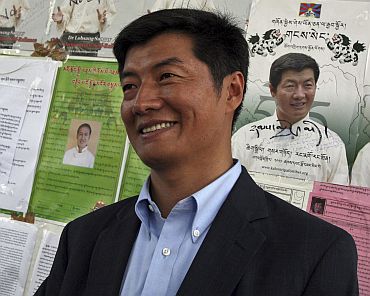
You have lived half your life in India and half in the United States. How do you compare India and the US?
No, 16 years in the US and 25 years in India.
India gives mental comfort and the US gives you physical comfort. India gives philosophy, spirituality and unity in diversity and America gives the knowledge and leadership qualities; this has been my experience during the 16 years that I was in Harvard University where you have the brightest people.
Are these qualities complementary?
Yes, if you can combine the two, it is good. In India, people are sometimes more laid-back, while America is more on the fast track, and more consumerist. India has spirituality and a sense of community and family. If you combine the best of the two, it makes a good world.
For the Tibetan movement, is it good to incorporate both?
Yes, I will combine what I learnt in America with what I absorbed in India. Definitively!
In your academic career, did you often meet Chinese scholars or students?
Yes, hundreds, thousands!
What are your feelings? Is there a possibility of understanding?
I have met a lot of nice, friendly, open-minded Chinese scholars. We discuss things and agree on many points.
At the same time, there are many ignorant, arrogant, nationalistic students or scholars who put your mood off. There are all kinds of Chinese; when you meet the moderate, liberal ones, you feel that we can find a solution. But with the hardliners, the nationalistic ones, you feel it might be impossible. It depends which Chinese will take over China in 2012. As far as Tibet is concerned, hardliners have always dominated the scene.
Do you feel that in 2012 the soft line will prevail, particularly with Xi Jinping?
Whenever there is an 'election', the hardliners usually prevail. It is safer for the party! Nationalism is on the rise in China, with the growth of their economic power they think the 21st century is theirs. In this atmosphere, the more nationalistic you are, the more your position or promotion becomes safe.
What about Xi Jinping who has a past history with Tibet?
His father Xi Zhongxun served in Tibet. He knew the late Panchen Lama quite well and he had direct dealings with Tibet. How much this will influence Xi Jinping, I can't say.
President Hu Jintao was the party secretary in Tibet for three years [1989-92]; he remains the most knowledgeable Chinese leader on Tibet.
It is at least what WikiLeaks says. Another question: are you the Tibetan Obama?
(Laughing) I am not the Tibetan Obama, but the people started labeling me so because we went to the same school and also because I represented 'change' in this election.
Did you use the word 'change' in your campaign?
Actually, I did not. The environment (for change) was there in the Tibetan community. I fitted this profile; the way I spoke, the way I did things, resonated with the people. The change that I brought is to go to the people. It was appreciated. "For the first time, someone is coming to us!"
We need to be more accountable, more responsible to the people.
Watch this space for the second part of the interview